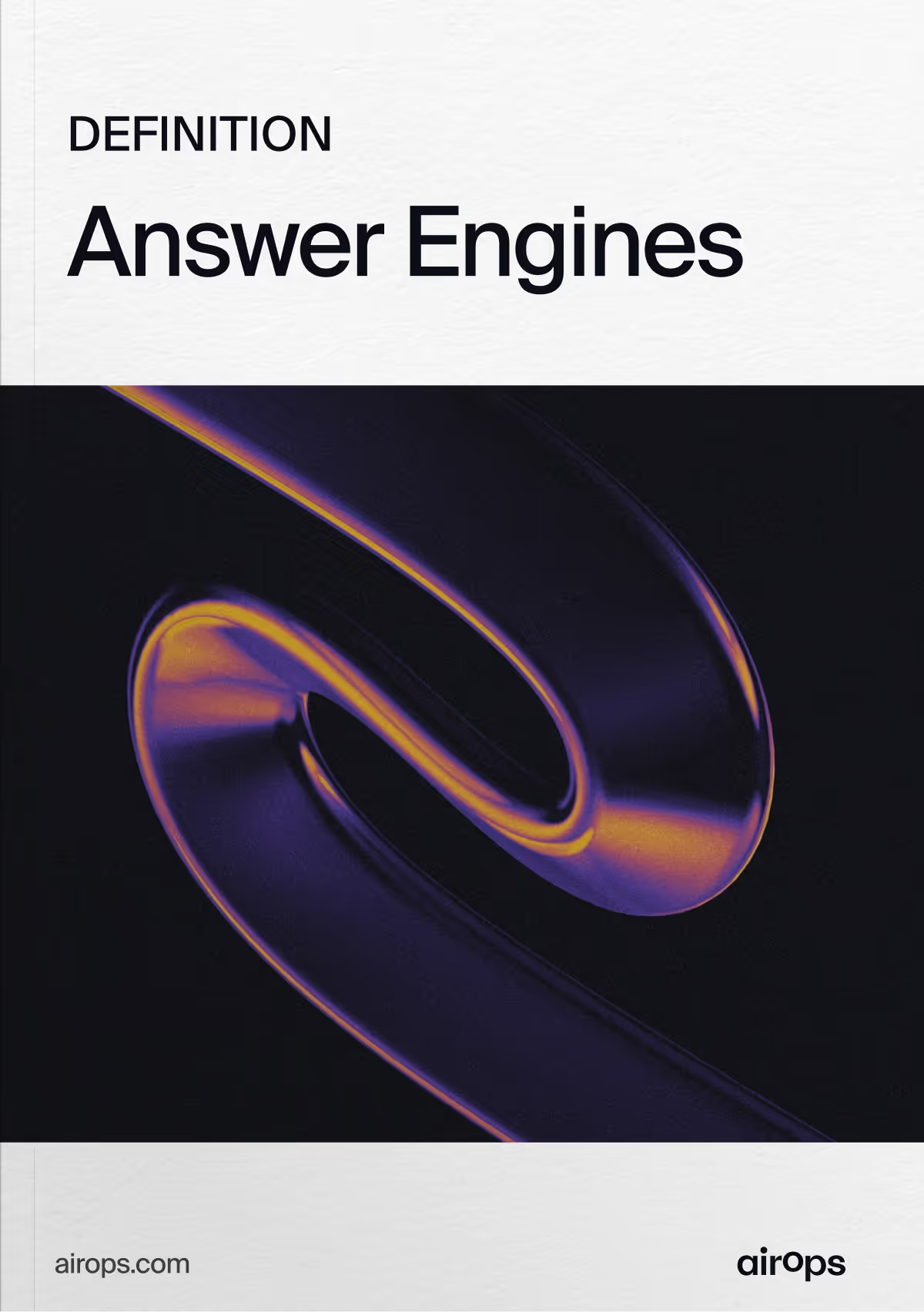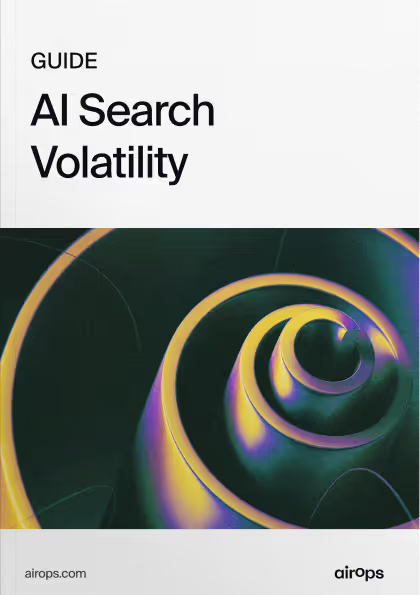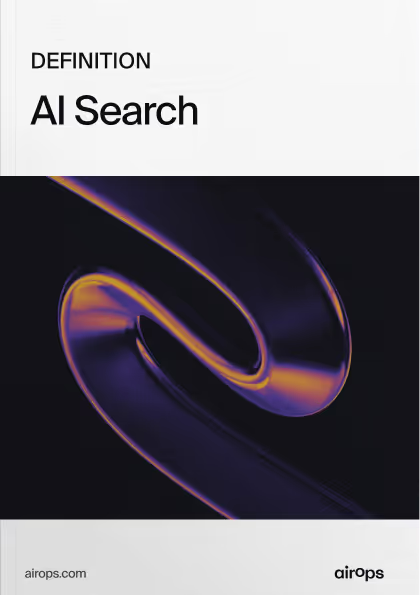What Are Answer Engines?

What Are Answer Engines?
Answer engines are advanced search systems that use artificial intelligence to interpret questions, gather information from trusted sources, and present clear, synthesized answers instead of a list of links.
Complete Definition:
An answer engine is a type of search platform that uses artificial intelligence, natural language processing (NLP), and large language models (LLMs) to understand user intent, gather information from authoritative sources, and present a clear, synthesized response across web, voice, and chat interfaces.
How Do Answer Engines Differ from Traditional Search Engines?
Unlike traditional search engines, which focus on keyword matching and return ranked lists of web pages, answer engines prioritize immediate information delivery, contributing to zero-click search. They interpret natural language queries, extract relevant details from multiple sources, and compile them into a single, authoritative answer.
Where Users Encounter Answer Engines
Answer engines appear across multiple environments where users search for or request information.
These include:
- Web-based LLMs and AI chatbots: ChatGPT, Claude, Gemini, Perplexity
- Voice assistants: smart speakers and mobile devices (e.g., Alexa, Siri, Google Assistant)
- Search-integrated overviews: Google AI Overviews and Bing Copilot
- Embedded AI interfaces: apps, browsers, and software platforms
Types of Answer Engines
AI search engines come in different formats, each with distinct user experiences, discovery channels, and optimization opportunities. Understanding these types helps brands tailor content for maximum visibility and citations.
Large Language Models (LLMs)
Large language models are advanced AI systems trained on massive datasets to understand, generate, and organize human-like text. As core answer engines, LLMs interpret queries, determine relevant information, and synthesize content into clear, concise answers—often with citations.
Popular LLMs include:
- ChatGPT (OpenAI)
- Claude (Anthropic)
- Gemini (Google)
LLMs also power other types of answer engines, with each model’s design and training data directly influencing how those tools source information, structure responses, and maintain conversational context.
Generative AI Bots
Generative AI bots are consumer-facing applications that use LLMs to deliver conversational, human-like answers to user queries.
They maintain context across multi-turn interactions, pull information from multiple sources, and often provide citations to support their responses. These bots are designed for direct engagement through web, mobile, and embedded interfaces.
AI-Powered Voice Assistants
AI-powered voice assistants deliver spoken answers to user queries using AI and natural language processing. They interpret voice commands, retrieve relevant information, and respond conversationally, often without the user needing to view a screen.
Examples of voice assistants include:
- Alexa
- Siri
- Google Assistant
These assistants are embedded in smart speakers, smartphones, cars, and other connected devices, making them a primary way users access hands-free, immediate answers.
Google AI Overviews
Google AI Overviews synthesize and present AI-generated answers directly in Google Search results, pulling from multiple web sources and displaying citations.
These overviews prioritize quick, high-confidence answers, often appearing above traditional search listings and impacting click-through rates. Optimizing for inclusion requires strong entity clarity, structured data, and authoritative content.
Bing Copilot
Bing Copilot integrates AI-generated answers into Microsoft’s Bing search experience, delivering concise, sourced responses alongside or within search results.
It blends traditional ranking signals with AI reasoning, making citations in Copilot answers a critical factor for brand visibility in Microsoft’s search ecosystem.
Why Are Answer Engines Important?
Answer engines are reshaping how information is discovered, consumed, and trusted online. By delivering direct, AI-generated answers, they bypass traditional link-based navigation and concentrate user attention on a small set of cited sources.
For brands, this means that visibility, authority, and even market share increasingly depend on being referenced within these AI-generated responses.
- Zero-click discovery: AI-generated answers often satisfy the user’s query without a website visit, making authoritative content critical for brand discovery.
- Authority building: Consistent citations from answer engines signal credibility to both users and search algorithms.
- Competitive positioning: Brands mentioned and cited more often than competitors gain disproportionate share of voice in organic search.
- Shifting SEO priorities: Authoritative and unique content, and diversifying brand presence across channels are becoming core growth levers for gaining presence across answer engines.
- Multi-platform impact: Answer engines influence visibility across web search, voice assistants, chatbots, and embedded AI tools.
FAQs
How are answer engines changing user expectations compared to traditional search?
Answer engines shift user expectations from browsing multiple links to receiving immediate, synthesized answers. Instead of evaluating sources themselves, users increasingly trust the platform to determine what information is most accurate and relevant. This changes how credibility is earned, since being included in the answer matters more than simply ranking on a results page.
Why does visibility in answer engines matter even if they don’t drive clicks?
Answer engines often satisfy queries directly, making the generated answer itself the primary point of discovery. When a brand is cited or mentioned, it gains trust and authority even without a website visit. Over time, repeated inclusion in answers shapes user perception, influences decision-making, and determines which brands are seen as category leaders in zero-click environments.
Why is brand visibility important for discoverability in answer engine platforms?
Visibility in answer engines determines whether your brand is included in AI-generated responses. Being cited builds brand authority, increases trust with users, and ensures your brand remains discoverable as more queries are answered directly without clicks.
Why does visibility in answer engines matter even if they don’t drive clicks?
Answer engines often satisfy queries directly, making the generated answer itself the primary point of discovery. When a brand is cited or mentioned, it gains trust and authority even without a website visit. Over time, repeated inclusion in answers shapes user perception, influences decision-making, and determines which brands are seen as category leaders in zero-click environments.
Win AI Search.
Increase brand visibility across AI search and Google with the only platform taking you from insights to action.
Table of Contents
Get the best and latest in growth and AI search delivered to your inbox each week.




